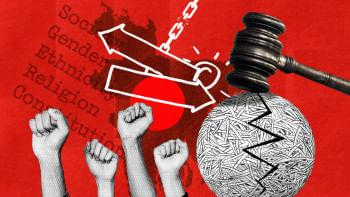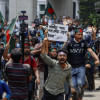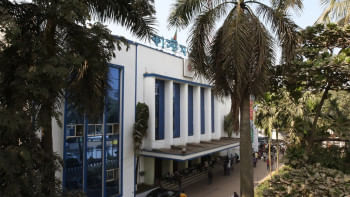Some proposals for constitutional reform

Reviewing the history of the 1990s uprising and its aftermath, it can be observed that although there was a desire to transition from autocracy to democratic governance, the issue of necessary constitutional and institutional reform did not receive due importance. As a result, many undemocratic articles remain in the constitution, making it possible to establish a parliamentary dictatorship in the country. Learning from that history, the demand for reforming various state institutions and the constitution has grown stronger after the July 2024 uprising.
However, the current interim government lacks the political representation and organisational capacity to handle the intense ideological battle that would arise if the entire constitution were to be rewritten. Therefore, rather than rewriting the constitution, priority should be given to reforming the functional parts of the constitution that are essential to ensure political rights, fundamental rights, a balance of power between the prime minister and the president, fair elections, and the separation of the judiciary from the executive branch, among others.
The Constitution Reform Commission should recommend reforms based on the opinions of various sections of the population. Afterward, depending on political consensus, those reforms must be implemented on the basis of a two-thirds majority through discussion and debate by members of a constituent assembly or parliament elected by direct vote of the people.
The following crucial reforms can be made to the constitution:
Fundamental rights
To ensure the absolute fundamental political rights of citizens, articles in Part III of the constitution—particularly Articles 32 to 44—should be freed from restrictive conditions such as "public interest," "public order," "public morals," "public health," or "legal restrictions."
Powers of prime minister and president
a) An article should be added to the constitution stipulating that no one can serve as prime minister or president more than twice and that they cannot lead any political party while in office.
b) Article 48(3) of the constitution should be amended to abolish the provision requiring the president to act on the advice of the prime minister. This will prevent the prime minister from being involved in appointments such as those of the attorney general, auditor general, public service commission members, and judges.
c) The necessity of the president seeking advice from the prime minister under Article 57(2) should be removed. A provision should also be added to allow impeachment of the prime minister for wrongdoing by a majority vote of parliament.
Election
a) To ensure fairer and more credible parliamentary representation and avoid domination by large parties, Article 65 needs to be amended to shift from the current first-past-the-post (FPTP) system to a mixed system incorporating both proportional representation (PR) and the FPTP system. Provision should also be made for the direct election of reserved seats for women.
b) To ensure the impartiality of Election Commission (EC) members, Article 118 of the constitution should be amended to require the appointment of EC members with the approval of two-thirds of parliamentarians. A separate budgetary system should also be introduced to ensure the EC's autonomy, removing its dependence on the executive branch.
c) A provision should be introduced stipulating that EC members cannot be removed without specific legal violations.
d) The electoral system under a caretaker government should be reinstated until state institutions, including the EC and law enforcement agencies, become neutral and capable. A provision for national consensus should be introduced to ensure that the caretaker system cannot be abolished by a single party using its majority.
End of parliamentary dictatorship
Article 70 of the constitution should be amended to allow MPs to vote against their party in all cases except no-confidence votes.
Government accountability to parliament
a) Strong and effective Parliamentary Standing Committees are needed to hold various ministries accountable. To this end, Article 76 should be amended to make opposition leadership in parliamentary committees mandatory, and a provision should be added requiring the government to seriously consider committee recommendations.
b) Article 55(3) should be amended to ensure both collective and individual accountability of cabinet members to parliament.
Domestic and international agreements
Articles 145 and 145A should be amended to require mandatory parliamentary discussions before signing significant agreements with any domestic or foreign entity.
Independence of judiciary
a) Article 48(3) should be amended to exempt the president from requiring the prime minister's advice for appointing judges under Articles 95(1) and 98.
b) Article 116 should be amended to entrust the Supreme Court with control over judicial service personnel, including posting, promotion, and discipline.
c) Article 95(2) should abolish the provision allowing the appointment of judges from advocates with 10 years or more of experience—because if there is such a provision, there is more opportunity for political appointments. Moreover, there is no guarantee that an experienced advocate means a good judge.
State of emergency
Article 141A should be amended to clearly specify the circumstances under which the president can declare a state of emergency, so that the government cannot take away the fundamental rights of the people by issuing a state of emergency under vague justifications like "external aggression" or "internal disturbance."
Constitutional court
A provision for a constitutional court should be added for the interpretation, protection, and enforcement of the constitution.
Religious freedom
Article 2(a) on state religion should be rewritten to clarify that the state shall ensure every citizen's freedom to practice and believe in their own religion.
State language
Article 3 should be amended to recognise the languages of all ethnic groups in addition to Bangla.
Nationality
Articles 6(2) and 9 should be amended to recognise all ethnic peoples of Bangladesh in addition to Bangalees.
Local government system
a) Parliamentarians' responsibilities should be limited to law-making. Articles 59 and 60 should be amended to ensure local government authority and participation in development activities.
b) District and upazila administration and law enforcement officials should be made accountable to the elected representatives of their respective local governments.
Economic and social rights
a) The economic rights mentioned in Articles 15 and 17—especially the right to universal education, medical care, and social security—should be recognised as judicially enforceable fundamental rights. For this, the state can be given a specific time limit if necessary.
b) Article 20 should be amended to explicitly mention the state's duty to create employment for citizens and protect existing employment. It should also be made judicially enforceable.
c) Article 13 should be amended to make forced acquisition of agricultural land and eviction from homesteads in the name of "public interest" unconstitutional. Collective ownership rights of various ethnic groups should be recognised. These rights should also be made judicially enforceable.
From the experiences of different countries, it has been observed that reformed constitutions have often lost popularity due to insufficient emphasis on ensuring social and economic rights alongside political rights. Therefore, it is necessary to give due importance to various political, social, and economic rights while reforming the constitution for a successful democratic transition.
Kallol Mustafa is an engineer and writer who focuses on power, energy, environment and development economics. He can be reached at [email protected].
Views expressed in this article are the author's own.
Follow The Daily Star Opinion on Facebook for the latest opinions, commentaries and analyses by experts and professionals. To contribute your article or letter to The Daily Star Opinion, see our guidelines for submission.


 For all latest news, follow The Daily Star's Google News channel.
For all latest news, follow The Daily Star's Google News channel. 










Comments